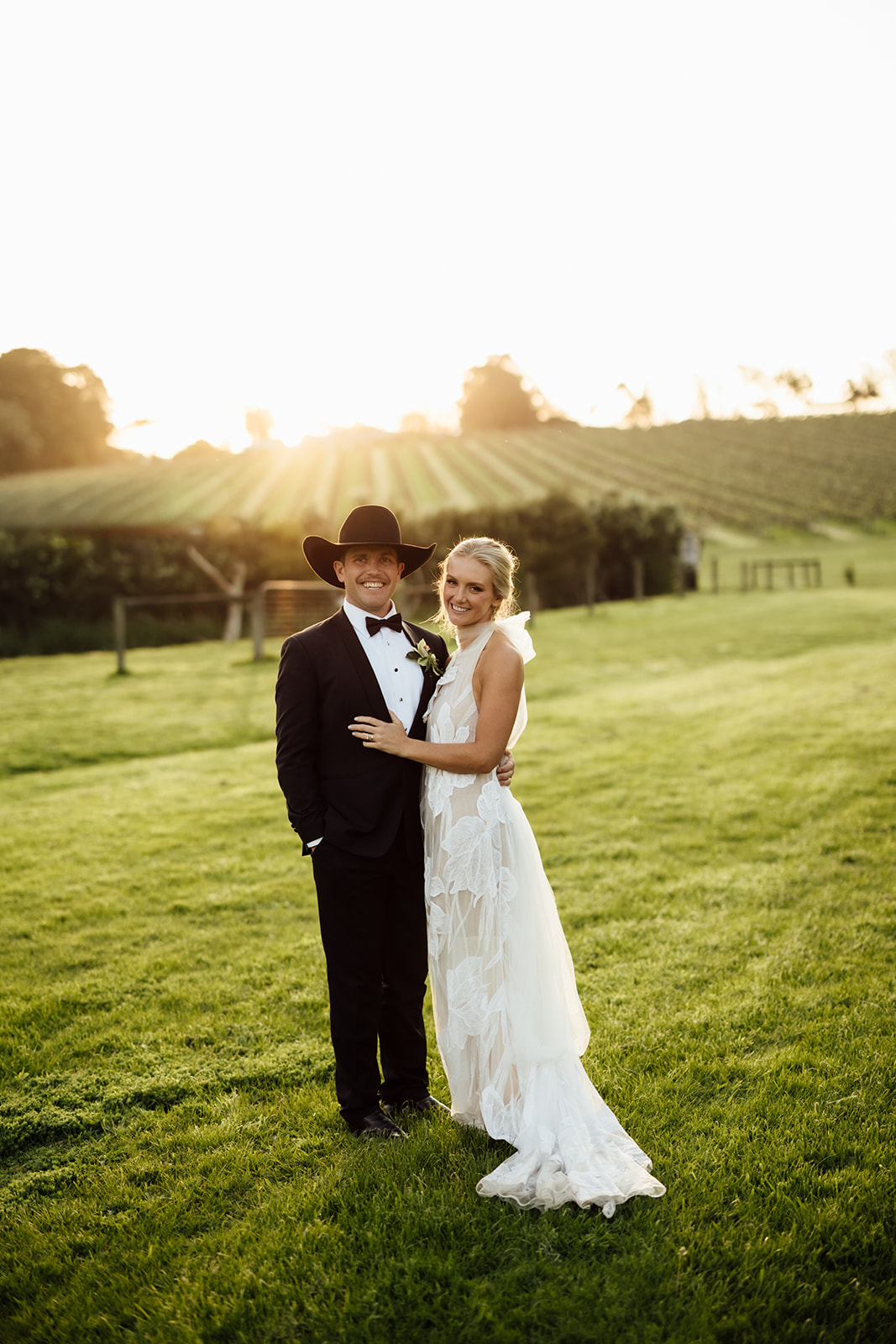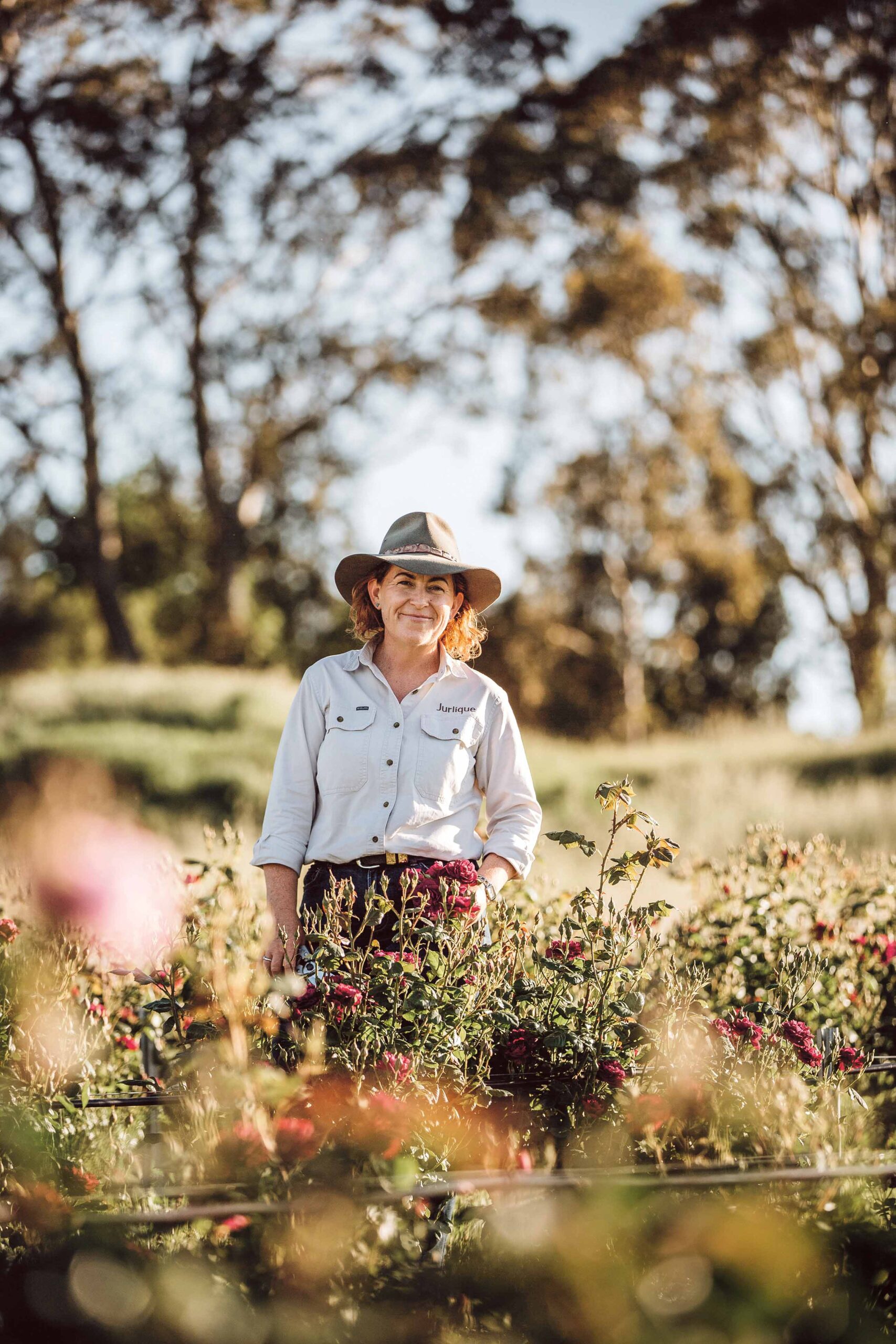PHOTOGRAPHY ELOISE MOIR
A bunch of zinnias, with some spikes of celosia.
Sign up to our mailing list for the best stories delivered to your inbox.
When she wanted to make a place for herself on her husband’s family farm, Samantha Campbell took up the challenge of growing flowers in the outback.
WORDS AMANDA DUCKER PHOTOGRAPHY ELOISE MOIR
Samantha Campbell knew, at one level, that growing cottage flowers at scale in semi-arid north-west Queensland cattle country was bonkers, but she didn’t let that stop her. The 30-year-old mother of three had no choice about the location. Rosebud station, grazed by her husband Eddie’s family for five generations, is a forever home for her family. If Sam wanted a flower farm — and she did, passionately — it would be here or nowhere.
“After having my third child, I was trying to rediscover who I was,” the former journalist says. “And I fell in love with the idea of flower-farming.”
The fact that Rosebud resembles the Wild West, with rocky red hills and spinifex and buffel grasslands as far as the eye can see, was just a detail to Sam. She knew cottage blooms tended to thrive in more temperate climes, but she wanted to give it a red-hot go in the north, anyway.
Early in 2023, Sam commandeered a disused 32 square metre goat yard near the homestead to establish a trial garden.
“There were no books or other resources for starting a flower farm out here and, if you look at our landscape, you’d know why,” she says, laughing. “I really had to learn the hard way. I did a lot of research on flowers that thrive in warmer climates, bought some seeds and went from there.”
She gave herself 12 months to see what she could grow. With the vital addition of soft, loamy soil hauled up from the creek, the trial produced healthy dahlia, zinnia, celosia, statice, stock, sunflower, gladiolus, rudbeckia, echinacea and more.
“I was shocked: I thought some wouldn’t survive, but I discovered I could grow seasonal flowers all year round,” Sam says. Simultaneously, she built a strong following with entertaining videos on her Rosebud Station Flower Farm Instagram account, with the pithy tagline: ‘Follow for successes, failures and flowers’.
“At first it attracted flower farmers, then other avid gardeners from other areas, then customers interested in purchasing bunches,” Sam says. With a promising local customer base, Sam upscaled her growing area almost twentyfold this year to plant her first commercial crop, again relying on creek loam to soften the hard red granite soil.
While Eddie helped with the infrastructure, Sam is usually the sole labourer. Hours of slashing or shovelling Brangus cow manure are among Sam’s less glamorous tasks. She often works with her young brood in tow in the afternoon after Toby, six, has completed his morning’s study with School of the Air. He sometimes helps Sam with planting, while Lucy, three, and Henry, two, play among the rows of raised beds.
Sam says her biggest challenge is having to rely on high-calcium bore water, which burns and stains flower petals.
“If we used a drip irrigation system, it would just block up, so we have to use sprayers, but I’ve adapted them to spray lower.” Avoiding chemical pesticides, she deploys Bugs for Bugs integrated pest management insects to combat aphid and mealy bug incursions. And she controls powdery mildew on her prized dahlia plants with a non-toxic concoction containing washing powder and soap.
The Southern Gulf region is reliably hot and dry most of the year, with a summer wet season. This year, winter brought an unwelcome surprise: an anomalous July frost, which wiped out her second crop of seedlings. This followed a blooming Mother’s Day, for which she’d timed the year’s first harvest. “I opened orders on social media in the lead-up to Mother’s Day, but within an hour I had to close to meet demand,” she says.
In August, her third commercial-scale planting — including lisianthus, ranunculus, poppy, sweet pea and anemone — began to flower. Her latest trial involves several native varieties, including banksias and gums. And she has begun to incorporate wildflowers into some of her bunches.
Seven years on from her landing in Mount Isa, Sam says she feels like a different person than the ingenue who arrived fresh from New South Wales. Raised on a hobby farm at Gilgandra, in the Central West, Sam had moved 270 kilometres south-east to study journalism at Charles Sturt University in Bathurst. Upon graduating, she had no wish to follow the bright lights.
“I always felt drawn to country life,” she says. “There was never a part of me that wanted to end up in suburbia.” Her first posting was to the Moree Champion newspaper in north-west New South Wales. Six months on, she transferred to Mount Isa, where she worked on The North West Star and other publications.
“I had never travelled further north than Brisbane,” she says. “I was very surprised to find there was only a highway separating the town from the mine. I spent the whole first night crying, but I met my husband at the rugby that first weekend.”
Sam was covering the football for the Star and Eddie Campbell was playing. At some point in the evening, he invited her waterskiing at Lake Moondarra the next day. As the months passed, Sam realised she had fallen for both the daredevil man, who is a keen buckjump and bronc rider on the local rodeo circuit, and the rugged outback region.
The couple moved to Rosebud station just before their first child, Toby, was born in January 2018. Life shifted a gear when Eddie stepped up to manage Rosebud and other properties in the Campbell family’s 254,000 hectare cattle run just as they became first-time parents.
“Eddie was away a lot working in the stock camp and I was here at Rosebud bringing up a new baby all alone, with my family 2000 kilometres away,” Sam says. “When Eddie was home, he was a big help, but it was quite lonely.”
After maternity leave, she returned to journalism part time, but by the time she emerged from the Covid era with two more babies to look after, something had to give.
“I looked in the mirror and I thought, ‘Who are you? You’ve changed so much.’ I didn’t know what I enjoyed anymore.”
Sam was breastfeeding newborn Henry on the lounge two years ago when she came across the wildly popular Floret Flower Instagram account of US flower farmer Erin Benzakein, who grows her blooms in Washington state’s Skagit Valley.
“I fell in love with what she was doing,” Sam says. “I kept going back to her page, in awe of the beautiful flowers she was growing. And I bought and read her three books.”
Like Erin, Sam is combining a green thumb with strong communication skills. Unlike Erin, presumably, who has an international following for seeds of the varietals she has developed, Sam delivers to all her customers, mostly based 60 kilometres east in Mount Isa or 60 kilometres west in Cloncurry.
“I really enjoy the whole process,” she says. “It is so satisfying to start something from a tiny seed and grow it into beautiful flowers to arrange and share. The most heartwarming moment is hand-delivering them to people and watching them light up. The best response is when people say ‘I can’t believe they are growing up here’.”
For more on Sam’s flower farm, go to rosebudstationflowerfarm.com.au.

The Mornington Peninsula has never seen so many cowboy hats — but for Greta Stonier and Ben Ryan, the winery was the only venue that made sense.

Raised on a dairy farm near Hahndorf, SA, farm manager Cherie Hutchinson has a deep love for the land she works on.